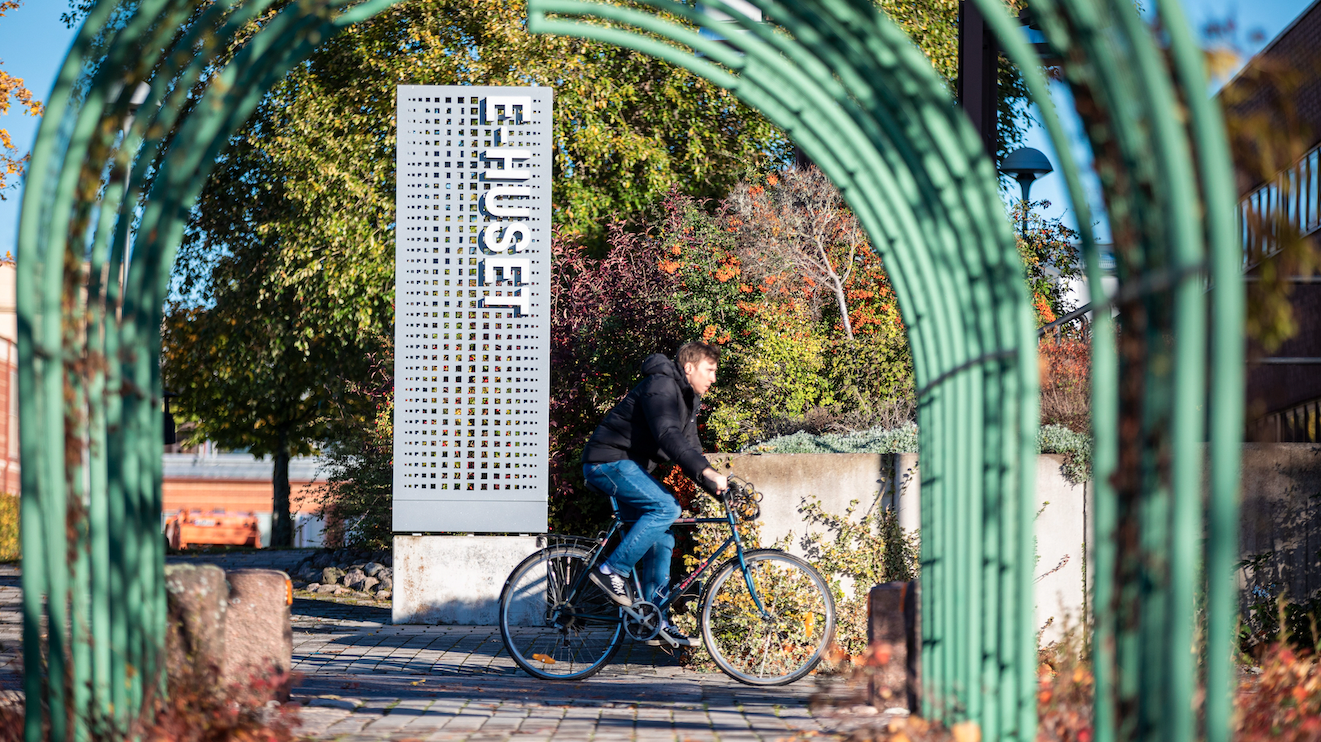Posted on August 14, 2025
Our online Digital4Business Master’s programme in cutting-edge digital technologies is offered through a collaboration of four top European Higher Education Institutions. Let’s discover more about our partners, starting with Linköping University (LiU).
Established in 1975 as an independent university, it has grown rapidly into one of Sweden’s largest institutions with over 44,000 students. It has been a pioneer in problem-based learning, launching the country’s first PBL-based (project-based learning) medical curriculum in 1986, and co-founded the global CDIO engineering education framework in 2000.
LiU is among the world’s top universities in international rankings, and its graduates are sought after in the labour market. It is committed to equipping students with future-ready skills through problem‑based learning, focusing on digital transformation and sustainability.
It was recognised as a top‑50 “young” university by QS Under 50 and among Europe’s leading centres for interdisciplinary and digital research.
The team at Linköping University (LiU) are really excited about their involvement in the Digital4Business programme. They’ve been instrumental in the development of the course content and teaching in modules on Cybersecurity for Business and AI for Business.
The Cybersecurity for Business module is aimed at IT professionals and data enthusiasts eager to advance in the field of digital protection. It opens up careers in cybersecurity analysis, data protection, ethical hacking, information security management and many related paths.
Deep theoretical depth with hands-on training
Technology, software, and systems alone cannot deliver value unless people are trained to use them effectively. Linköping University (LiU) is committed to delivering an exceptional Cybersecurity module for D4B participants, specifically designed for professionals. The approach combines real-world case studies with hands-on learning, problem-based activities, and gamified concepts.
“Cybersecurity is an essential competence for every sector of society, as digital systems now underpin critical infrastructures, financial services, industrial operations, and government functions,” says LiU Assistant Professor and D4B lecturer Gurjot Singh.

A mission to bridge academia and industry
He adds: “Led by Associate Professor Mikael Asplund, one of Sweden’s leading cybersecurity experts, the module blends theoretical depth with practical, hands-on training using LiU’s state-of-the-art Cybersecurity Lab. Here, participants simulate both defensive and offensive security scenarios, defending systems from cyberattacks, managing security incidents, and developing strategies informed by the attacker’s perspective. This training ensures participants can assess threats, manage risks, and design security strategies capable of withstanding real-world challenges.”
Gurjot took the time to delve deeper into the role of LiU in Digital4Business, shining a light on their cutting-edge approach, and the expertise of the wider team.
What motivated your university to participate in the Digital4Business programme?
Gurjot: “Digital4Business is an EU-funded initiative designed to bridge the gap between traditional education and the upskilling needs of today’s workforce. While many academic programmes focus on students continuing their studies, D4B targets professionals already working in industry who seek to update their knowledge with the latest technologies and concepts. This aligns perfectly with LiU’s mission of bridging academia and industry through targeted knowledge transfer. Our participation is driven by the shared belief that learning must be tailored to real-world business needs and delivered using both traditional and modern digital pedagogical tools.”
Can you describe your university’s specific contribution to the programme’s curriculum or focus areas?
“LiU plays a central role in D4B’s development, from contributing to the overall programme framework to creating two core courses: Cybersecurity and Artificial Intelligence. We work collaboratively with other academic partners to design engaging and relevant content, and we serve on the Quality Assurance Team, made up of both academic and industry experts, to ensure that every course module is of the highest standard and directly relevant to professional needs.
“The AI module, led by Professor Fredrik Heintz, a key contributor to the EU’s first AI Act and Coordinator of the European AI network, prepares learners to implement safe, ethical, and innovative AI solutions across industries. The Cybersecurity module is led by Associate Professor Mikael Asplund, leveraging LiU’s advanced Cybersecurity Lab to offer simulated security challenges and incident response training. Both modules are built upon LiU’s strong research standing in WASP (AI) and Cyberly (cybersecurity) research clusters.”
“Europe’s most innovative city”
What can students expect from your university during their time in the programme?
“Students can expect an engaging, career-focused learning experience that equips them with skills in high demand across industries. Courses are delivered by experienced professors, Fredrik Heintz and Mikael Asplund, and enriched by guest lectures from leading industry experts. Learning is hands-on, with case studies, problem-solving activities, and immersive exercises designed to build real-world cybersecurity competence.
“The programme also offers valuable networking and mentoring opportunities, including professional guidance on certifications and career progression, with mentorship extending beyond the programme itself.
“While the programme is mainly online, students also join sponsored in-person events at partner universities. This includes on-site workshops for each module, such as a March session for our course, and proposed visits to innovation hubs like Ericsson Innovation Park and the National Supercomputing Centre in Linköping.”
How does your university prepare students for their future careers in digital business or related fields?
“The curriculum is continuously updated to reflect evolving industry demands, ensuring graduates possess skills that are both relevant and future-proof. Students benefit from access to advanced resources, including state-of-the-art labs, extensive libraries, and specialised facilities to support their research and project work. Practical skills are further enhanced through workshops, hackathons, and other hands-on learning opportunities. At LiU, students thrive in an inclusive and innovative environment. Linköping, officially recognised by the EU as Europe’s most innovative city, is home to a vibrant ecosystem of startups and the headquarters of major technology companies.”

“Graduates from LiU’s AI and Cybersecurity training initiatives have gone on to secure strategic roles in leading technology firms, government agencies, and innovative SMEs. Many also contribute to policy development in digital security and AI ethics, reflecting LiU’s leadership in shaping the responsible use of emerging technologies in Europe.”
How LiU leads the future of education and digital innovation
How does your university view the evolution of digital skills in education, and what role do you aim to play?
“At LiU, we continuously evolve our learning practices and curriculum to address modern needs and future challenges. Our leadership in this field is demonstrated through hosting Sweden’s national supercomputer, operating a dedicated didactics department that supports faculty in developing innovative and impactful teaching methods, and maintaining strong collaborations with industry leaders within Linköping’s vibrant innovation hub.”
How does your university incorporate emerging trends such as AI, blockchain, or big data into its research and teaching?
“LiU’s vision for 2030 is to remain a forward-looking, innovative institution where innovation is our tradition. We actively embed emerging trends such as AI, blockchain, and big data into both our teaching and research, exploring blockchain applications for supply chain security, AI for predictive maintenance in manufacturing, and big data analytics for healthcare innovation.”

What is your university’s vision for the long-term impact of the Digital4Business programme on European SMEs and the broader business landscape?
“Europe faces a significant digital skills shortage, a challenge expected to intensify in the coming years. SMEs often rely on local hiring but struggle to find employees with up-to-date technical expertise. D4B addresses this challenge by enabling professionals to reskill and upskill at their own pace, in line with industry demands.”
Driving innovation from the lab to the marketplace
In the Digital4Business Master’s programme, Linköping University blends pioneering research, advanced facilities, and industry collaboration to prepare professionals for the realities of a rapidly evolving digital economy. Together with our fellow universities, LiU offers learners a truly international education that turns cutting-edge knowledge into practical impact.
The application deadline is September 8, 2025 — APPLY TODAY





)